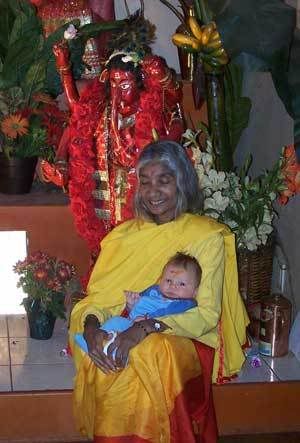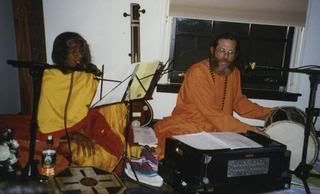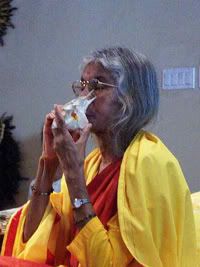
Photo of the week – Oct 5 – Oct 11 2007
(Picture taken Sep 2007 at the Devi Mandir)
Check out our new weekly blogs.
Temple of Divine Mother

Photo of the week – Oct 5 – Oct 11 2007
(Picture taken Sep 2007 at the Devi Mandir)
Check out our new weekly blogs.

Photo of the week – Sep 28 – Oct 4 2007
(Picture taken sometime back during world tour)

Photo of the week – Sep 14 – Sep 20 2007
(Picture taken Aug 2007 at the Devi Mandir)
~~OM~~
Question: I’ve heard that Shree Maa is associated with Kamakhya, will Swamiji comment.
Swamiji: She is the Goddess of Kamakhya. She is more than associated with Kamakhya, She is the soul of Kamakhya. And I want to tell a personal story if you don’t mind.
One day Maa was walking towards the boats, we were going to visit Umananda. Umananda is an island in the middle of the Brahmaputra. And a number of devotees were walking across the sandy beach down to the boats, to take the boat ride to the island on which stands a beautiful temple to Shiva. And the Brahmaputra is a great river. And this temple is submerged about four months of the year underneath the water, and then the other eight months of the year the water drains out, and as it drains out, the island appears. It’s an amazing temple!
We were walking maybe a dozen or more devotees with Shree Maa across the sandy beach down to where the boats were docked, and when we got about half way across the beach all the boat men came running up across the sand and started bowing down to Maa in the sand. And they were calling, “Mago Mago ashun ashun!” And they were saying, “Mother, You please come!”
And She led us down to the boats, and there were a couple of passengers sitting in the boats waiting for the boats to fill up so that the boat could leave. And the boat men said, “Uto, Ut, Ut, Ut, Ut, Ut! (Get out of the boat, Get out of the boat!) Make this empty, Shree Maa has come!” So I was looking at this in astonishment, because you know to get a rickshaw or boat is really an attainment. And here they were clearing the boats, Shree Maa has come.
So we sat down in the boat and as the boat man was rowing us towards the island Umananda, I struck a conversation with him. And I was speaking Bengali, he was answering in Assamese, and I had a friend, Paithi, who was translating where I got stuck. And he told a story of a day when there was a great storm on the Brahmaputra river. And Shree Maa was on the boat, on the steamer that goes between Gauhati, up the Brahmaputra, and it goes to Jorhat and many other towns along the river because the easiest way of communication was along the river. They don’t have so many highways, so they take the steamer, that was an accomplishment.
And when the storm hit the steamer, all the passengers were terrified and started screaming because there were waves and rocking, and everyone was afraid that the boat was going to go down and probably take them with it! And Shree Maa sat at the bow of the ship and started singing. And first, everybody looked at Her like She was nuts! And then the wind calmed down and it stopped raining and everybody sat down in a circle around her.
And ever since then She was known as the Goddess of Kamakhya. She became Shree Maa of Kamakhya. They all revered her with such esteem. And this was told to me by a boat man that I had never met, and he had no need to impress me. We were going to pay the fare no matter what.
So, that’s Shree Maa’s relation with Kamakhya. She did tapasya there. She spent many years on the mountain.
Kamakhya is a mountain on the edge of Gauhati city, and on the other side is the Brahmaputra river. There’s the temple of Kamakhya, and then there are several tirthas, other temples for other Goddesses. Just like Vaishno Devi is to North India, just like Meenakshi Devi is to South India, Kamakhya is to East India. It’s the most prominent Goddess temple in the region. And Shree Maa did tapasya there for many years, She’s very well known and very highly regarded.
So, that’s Her relationship with Kamakhya. Om Sam Saraswatyai Namaha. Namaste.
“If we love God with unconditional love, God teaches us in such a beautiful way. If we take one step towards God, God takes 10 steps towards us. Is it not beautiful? This is a delightful article about God’s unconditional love. …read more
On one such occasion Gauri Mata said to the devotees, “In Durga Saptashati, the Divine Mother is described as “the most beneficent among the beneficent, the fulfiller of wishes.” The Divine Mother fulfills all the wishes of Her devotees. …read more
Listen to Shree Maa sing I Love You All
Read Shree Maa’s Mother’s Day message here –
Mother’s Day 2007
~~OM~~
Guru Gita: Satsang with Shree Maa and Swamiji
In the following profound and elevating conversation, Shree Maa and Swamiji translate and discuss a Bengali commentary on the Guru Gita.
Mother is translating from a book by Nirmalananda, who is a disciple of Swami Pranavanandaji from Bharat Seva Ashram.
Who is the Respected Guru and what kind of behavior does the Guru exemplify? What is the Guru’s intrinsic nature and what is the principle of the Guru?
Who is able to take refuge in the Guru and what is the effect of taking refuge in Guru?
What is seva to the Guru, what is an offering to the Guru, what is the song of the Guru, and what is the discipline of a disciple?
What is the highest fruit of devotion to Guru?
The answers to all these questions are found in the scripture called Guru Gita.
Commentaries on Sri Guru Gita come from the Vishvasaara Tantra. These are expansions of the Guru Gita. Also people speak of Rudrayamal Tantra. All Tantras speak of the highest principle of the Guru.
In both the Vedas and Vedanta, the position of the Guru is held in very high regard. But in the Tantra scriptures, they speak of the Guru’s position as being the very highest. In the path of Tantra, the principle of Guru is the highest principle of all.
Guru is both the Supreme Divinity with form and without form.
The Guru is Brahma, Vishnu and Maheswar. The Respected Guru is both the motivation for the highest truth and the attainment and realization of the highest truth. These are illuminated in all of the verses contained in the Guru Gita.
The foremost principle and discussion of the highest importance has been given by Sada Shiva. His first student was Parvati.
Guru Gita informs us by which sadhana, by what means, can someone who wears a body attain success.
Without a doubt, Shiva has illuminated these questions in this scripture. The path of the Guru is the king of all dharmas (king of all ideals of perfection – the Supreme). In order to attain prasad (consecrated offering) from the Guru, your birth, your past, your karma (what kind of activities you perform) are not required subjects. The ignorant, the lazy and those steeped in darkness (tamas) will not proceed in this path. They are not capable of achieving the understanding of the wisdom of the principles. They don’t have wisdom or desire knowledge of liberation.
It is incumbent upon all those who take refuge in the Guru to do so with their body, mind and speech.
Seva (selfless service as an expression of love) to the Guru, Puja, aaradhana is a disciple’s sadhana. Giving pleasure to the Guru is your sadhana, your worship.
Whoever is able to do atma samarpan (surrender of his or her own soul in equilibrium) to the Sri Guru’s Feet – giving up all their attachment – this is samadhi and siddhi (attainment of perfection). This is the path of the Guru.
The Guru is not a human being. The Guru is the Supreme Divinity made manifest. Because of this, we cannot look at our Guru as just a human being. This Guru principle is united with all pure qualities, beautiful attributes, the greatness of all purity. This is the authority that comes through the Guru.
If you can perceive these qualities in your Guru, you will not think of your Guru as a mere human being. The Guru is Bhagavan (Supreme Divinity).
All the qualities and all the attitudes, all the energies and all that is Infinite or eternal, all the wisdom that is inculcated – all these qualities are only reflected in God. That Godliness is reflected in the Guru. So we should not think of the Guru as a human being. We would think of the Guru as the emblem or representative of Supreme Divinity.
Where there is atma samarpan, the disciple becomes a mirror and there is union between Guru and disciple in a great radiant light. When there is a transfer of energy from Guru to disciple and surrender, there is a light that is incomparable to anything you can see with worldly eyes.
Trailinga Swami once locked himself in His room for three days. His disciple was very worried and wanted to see Swamiji. He went to the door and banged and banged and banged. Trailinga Swamiji said ‘Who are you?”
The disciple was full of his own ego self, and replied, “I am so and so”. He felt he was a real disciple, but he was not at that moment. There was no response from within. On the second day, the disciple went again and banged on the door and received the same question. Again he answered, “I am so and so”. Nothing happened. On third day, the disciple thought deeply and cried, “Why is the Guru doing this to me?”
Again he knocked on the door with reverence. Trailinga Swami asked, “Who are you?” The disciple replied, “You.” Trailinga Swamji opened the door.
The Guru-disciple relationship is very subtle. Atma samarpan has become a big market nowadays. The relationship between Guru and Disciple is truth. A truthful relationship means surrender. You will get everything with surrender.
Where is the individual form of God? Ishwara, God, the Supreme Soul, is everywhere, in every place. He is in the gross body, the subtle body, the modifications of the mind and unmanifest as well. How can the individual wearing a body grasp Supreme Divinity, find Him, touch Him with sensory knowledge? With our current perception, this is a very difficult issue.
There is a solution to this issue in Hindu Dharma. Scriptures say that He who understands Supreme Divinity, becomes Supreme Divinity. Who has refined the discipline of sadhana, becomes united with all the tendencies of sadhana, he understands the nature of the Supreme Divinity. That individual becomes a representative of Supreme Divinity.
A great example of that is Swamiji!!! This moment Swamiji does not need sadhana. He can go to the Himalayas and be by Himself. But to show the world, He is doing sadhana.
We are born, we learn how to walk, first we learn from our parents – how to walk, how to eat – step by step, our whole life is sadhana. In childhood we are learning how to be human. Now we are learning how to be with the soul. Without sadhana, we will never know.
The Supreme Divinity, the teacher, and the yogi who has attained divinity are all one.
The Yogi is actually a murti – the perceivable form of Supreme Divinity. All the true qualities of a Yogi are illuminated in reality.
We believe that according to the needs of the age, God Himself comes in an embodied form. That Supreme Divinity which is Infinite beyond conception takes a human form and takes birth in the mortal world.
He is undefeatable and that is the Supreme Divinity manifested amongst all the elements of existence.
When we do surrender our soul in equilibrium (atma samarpana), we receive Diksha. The first chapter of this experience is to receive a mantra in the ear, but that is only the first chapter. Om
By Paul Logan, Journal Staff Writer
Friday, November 10, 2000
A woman many believe to be one of the rarest individuals on earth “a living saint” has come to Albuquerque to share her love.
Shree Maa, “the respected Holy Mother,” said Thursday she is here because “I love to see my family. The whole universe is my family.”
Draped in layers of orange, red, gold and yellow clothing with beads around her neck and wrists, the graying, middle-aged Hindu holy woman with a gentle voice is about 5-feet, 5 inches tall and less than 100 pounds.
Maa said she has been enlightened since her birth in Assam, the northeast corner of India. Having enlightenment includes experiencing pure love and comprehending truth.
Sitting cross-legged on a couch at a Northeast Heights home, Maa said she attended an international yogi conference in Texas and is returning by motor home to California. Her home is a modest trailer in the mountains, about a half hour outside of Napa.
Maa said she has been sent “to perform God’s work in this world.”
Maa spends about nine months each year traveling throughout the world to share her teachings.
Instead of attracting followers, she said wants to show people of all faiths how “to build temples in their hearts and in their minds.”
Her assistant, Swami Satyananda Saraswati, or Swamiji, said a person’s every action can change a house into a temple. By respecting one’s actions, a person is paying attention to what he or she is doing.
“So any action that we do without selfishness can be a form of worship,” Swamiji said. “We can make divine everything that we do.”
During the interview, some of Maa’s devotees were chanting scriptures in Sanskrit in another room. Nearby, a coffee table had been converted into an altar with pictures and symbols from the world’s great religions, including Jesus, Buddha and Mary as well as flowers of every color and candles.
Swamiji said Maa adheres to the famous Indian proverb: “Just as many as there are individuals, so many are there paths to God.”
He said her programs are open to everyone and called them “unique” because “she makes worship fun.”
Maa said she offers those who attend three things: pure love, accepting everyone for what they are; inspiration, meaning she motivates each person to help make them better; and appreciation, recognizing every effort a person makes.
She met the late Mother Teresa, who some Catholics considered a living saint, years ago in Calcutta. Maa said she wanted to see her “because she is my family, also … I love her.”
Maa’s message includes being true to one’s self because then a person is without fear. With a clear conscience, a person’s heart is silent. “That,” she said, “is peace.”
Also:
WHEN: Today, 7 p.m., at Futures For Children building, 9600 Tennyson NE (332-4146); Saturday, 1 p.m., the home of Al and Dianne Lopez, 900 Avenida Cielito NE (255-4169); and Sunday, 1 p.m., again at Futures For Children
WHAT: Programs of meditation, singing, storytelling on Friday and Sunday; fire ceremony on Saturday
HOW MUCH: Free and open to everyone
Interview with Shree Maa at Sedona in 2006.
A day in the life of Shree Maa, as portrayed by a young photographer devotee.
Guru: The syllable Gu means darkness, Ru means light. The Supreme Divinity which destroys ignorance is verily the Guru, without a doubt.
The Guru is Brahma, the Guru is Vishnu, the Guru is Lord Mahesvara. The Guru is actually the Supreme Divinity, and all other expressions are links in the chain which bring us close to that realization.…read more
Indian swamis also foresee the birth of saints, including Shree Maa, one of the great women saints in contemporary history who has been described as kindness incarnate.
When Kalyani married Sushil, a wealthy man who managed a tea estate, she was only thirteen years old. One year after their marriage, the pious couple climbed Kamakhya Mountain to do worship in the Kamakhya Temple. Much to their surprise, Swami Bhuvananda Saraswati appeared before them when they reached the summit. This great saint and religious teacher who dwelt on the mountain at the Kalipur Ashram had a message for Kalyani: “I have been waiting for you. You are going to give birth to a divine child, and I want to give you mantra initiation with the blessings of God.” Kalyani protested, I am not pregnant. You are making a mistake. The Swami insisted, No, no, it is you. Thereupon, he approached the couple, stretched out his arms, and blessed them with sacred prayers. He whispered the Gayatri mantra, a powerful Vedic formula, into Kalyani’s left ear, and anointed her with holy water.